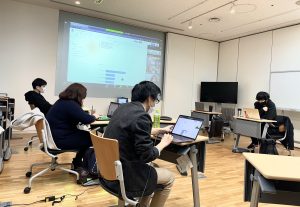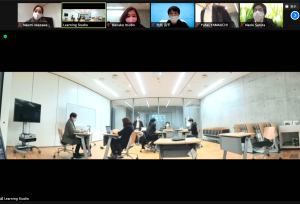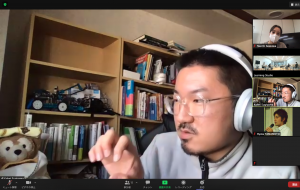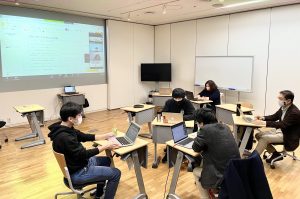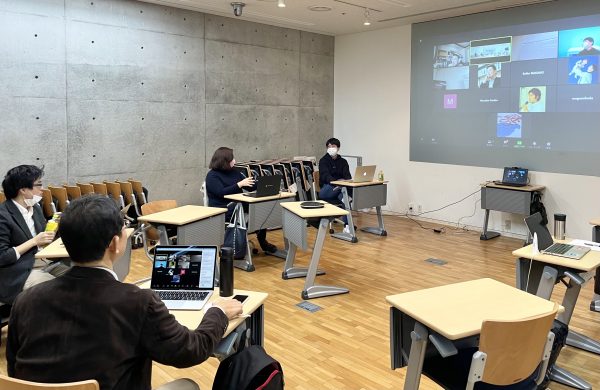
December 2, 2020
コロナ禍における研究活動 – 対面・同期型オンライン併用型授業の紹介 –The practice of hybrid-learning during the COVID-19 pandemic
新型コロナウイルス感染症の影響によりさまざまな制限がある中ですが、山内研究室では学習環境(空間・活動・共同体・人工物)をどのようにデザインすれば、より効果的な学びを支援できるのかについての研究活動を継続して行っています。その実践の一例として、山内ゼミはいま、対面と同期型オンライン(以下、オンライン)の併用で行われています。このような学習形態を「ハイブリッド学習 (Hybrid Learning)」と呼びます。
毎週8名は対面で、6名はオンラインでゼミに参加。対面の機会が平等に回ってくるよう、事前に振り分けられています。対面参加者は各自ノートPCを持参し、ミュートでZoomに繋ぎます。教室中央のマイクスピーカーが教室の発表者や質問者の声を拾い、オンライン参加者に届けます。発表者に対するコメントや、小グループでの活動も円滑に行われていると感じます。
オンライン学習では「雑談がない」ことが課題としてよく挙げられますが、対面も含めたハイブリッド学習にすることで、雑談が行われやすくなることがメリットの一つだと感じています。対面での参加者同士が雑談を始めて空気を和ませることで、オンライン参加者も話に加わりやすくなるのです。ときにはオンライン参加者の画面に映る本棚の雑貨などが話のきっかけとなり、趣味や価値観などの話に膨らむことも。意外なところから研究を進める上でのヒントを見つけたり、お互いの研究への想いに対する理解や共感が生まれたりと、雑談の重要性を実感させられます。
その他にも、個々の学習特性や当日の体調に合わせて参加方法を選ぶことができる、それぞれの環境から有効な情報を持ち寄ることができる、などのメリットがあります。新型コロナウイルスの影響は今後もしばらく続きそうですが、対面の「代替策」「妥協案」としてオンライン学習を続けるのではなく、対面・オンライン双方の学習効果を明確にし、実践のなかでより有効な学習方法を探っていく必要があるのではないかと思います。
<LINKS>
山内祐平「【エッセイ】オンラインと対面を組み合わせたハイブリッド学習」(Ylab 東京大学 山内研究室) 2020.07.08
山内祐平『学習環境のイノベーション』東京大学出版会, 2020
井坪葉奈子「【文献とディスカッション内容の紹介】MOOCsと豊かな学習環境」(Ylab 東京大学 山内研究室) 2020.09.14
記事・写真:岩澤直美(修士課程)
Due to the COVID-19 pandemic, learning and research activities at Yamauchi Laboratory are currently being conducted through a combination of face-to-face and synchronous online learning. We call this type of learning “Hybrid Learning”. We are continuing our research on how we can design learning environments to support effective learning.
Every week, eight of us join face-to-face, and six online. Face-to-face opportunities are distributed equally, but in the end, each of us have the right to decide how and from where we join. Face-to-face participants bring their own laptops, join Zoom, and mute themselves. A speaker phone in the center of the classroom picks up the voices of the voices in the classroom and delivers them to the online participants.
The lack of “chit-chat” is often noted as a downside of online learning. One of the advantages of hybrid learning is that this “chit-chat” can be stimulated. By having the in-person participants start chatting first, it becomes easier for the online participants to join the conversation. Every so often, we notice something interesting from the online participant’s bookshelf, which can lead to small talk about their hobbies and values. Unexpectedly, this “chit-chat” can sometimes give us inspiration for new research ideas, as well as deepen understanding of each other’s research passions.
Another advantage is that we can decide how to join the class depending on our individual learning styles or the situation on the day. Instead of adopting online learning as an “alternative” or a “compromise” to face-to-face learning, we should keep exploring effective learning by understanding the characteristics and learning effects of each learning type.
<LINKS> (Japanese)
山内祐平「【エッセイ】オンラインと対面を組み合わせたハイブリッド学習」(Ylab 東京大学 山内研究室) 2020.07.08
山内祐平『学習環境のイノベーション』東京大学出版会, 2020 (Yamauchi, Yuhei. Innovation of Learning Environments. University of Tokyo Press, 2020.)
井坪葉奈子「【文献とディスカッション内容の紹介】MOOCsと豊かな学習環境」(Ylab 東京大学 山内研究室) 2020.09.14
Text & Photo: Naomi Iwazawa (Masters Student)
Proofreading: David Buist (Project senior specialist)
主担当教員Associated Faculty Members
教授
山内 祐平
- 文化・人間情報学コース
- アジア情報社会コース
Professor
YAMAUCHI, Yuhei
- Cultural and human information studies course
- ITASIA Program


